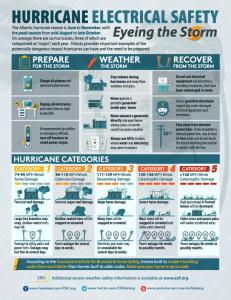The Atlantic hurricane season runs from June to November, with the peak season happening between mid-August to late October.
FL, UNITED STATES, June 2, 2022 /EINPresswire.com/ — The Atlantic hurricane season, which runs from June 1 to November 30, has begun, and the Electrical Safety Foundation International (ESFI) is releasing tips to help you prepare for hurricanes and severe storms. The National Oceanic and Atmospheric Administration (NOAA) is predicting an above-average season with a possibility of six to ten hurricanes, three to six of which may be major. Consumers should be aware of the electrical dangers associated with severe storms and the resulting floods and power outages.
ESFI is offering consumers important advice about how to help prevent electrically related deaths, injuries, and property loss by taking the following precautions during and after severe storms and other natural disasters:
Hurricane and Severe Storm Safety Tips
Prepare for the storm
•Charge all phones and communications devices
•Unplug all electronics and move them as high as possible
•If recommended by utilities or emergency offices, turn off breakers to avoid power surges
Weather the storm
•Stay indoors during hurricanes and away from windows and glass
•Never operate a portable generator inside your home
•Never connect a generator directly into your home’s wiring unless a transfer switch has been installed
•Always use GFCIs in areas where water and electricity may come in contact
Recover from the storm
•Do not use electrical equipment and electronics, including receptacles, that have been submerged in water
•Have a qualified electrician inspect any water-damaged electrical equipment and electronics
•Stay away from downed power lines. If you encounter a downed power line, stay at least 35 feet away and do not touch the line or anything that may be in contact with the line
Location
•Always keep generators at least 20 feet away from your home
•Never operate a generator in an enclosed space
•Keep generators away from doors, windows, and vents
Use
•Always use grounded cords and inspect cords for damage prior to use
•Keep generators dry, do not operate when wet, and refuel when cool
•Do not overload generators, and do not plug a generator directly into your home. Connect items being powered directly to the generator
Transfer Switches
•Transfer switches are the only way to safely power your home’s electrical system
•Using a transfer switch prevents backfeeding. This occurs when your generator becomes a power source for the surrounding area and can damage your home, your neighbor’s home, and injure workers trying to restore power
Carbon Monoxide (CO) Poisoning Prevention
•Improper use and installation of generators could cause CO poisoning
•Make sure your home has carbon monoxide alarms outside each sleeping area and on every level of the home
•If you experience CO poisoning systems, get fresh air, do not reenter areas, and call 911
Deaths and injuries during the summer months are frequently caused by post-storm electrical hazards. The high winds, extreme rains, and flooding caused by hurricanes and tornadoes present many unique dangers, so consumers should be aware of these hazards to keep themselves safe. For ESFI’s complete collection of free-to-share disaster safety resources and information about using them in your community, visit esfi.org.
ABOUT ESFI
ESFI is a 501(c)(3) non-profit organization dedicated to promoting electrical safety at home and the workplace. For more information and to use ESFI’s free resources throughout your community, visit esfi.org.
# # #
Brianne Deerwester
Electrical Safety Foundation International
+1 703-841-5935
email us here
Visit us on social media:
Facebook
Twitter
LinkedIn
Other

